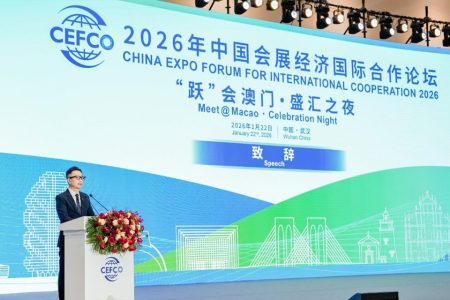The tourism, hospitality and gaming sectors have been quick to embrace Artificial Intelligence (AI), eager for myriad benefits that range from product personalisation to customer behaviour analysis.
As with any new technology, however, there are ethical considerations and regulations that need to be taken into consideration, said Serge Stinckwich, the head of research at the United Nations University Institute in Macao, and Scott Yang, the Zhuguang Group’s project development manager. They were speaking at a breakfast talk organised by the France Macau Chamber of Commerce (FMCC) this morning at the Sofitel.
Moderated by the head of FMCC’s technology innovation committee, Charles Fauchet, their discussion was entitled “Navigating the New Landscape: Regulating AI and Data Ethics in Tourism.”
The discussion began with the topic of cross-border data flows. Stinckwich mentioned that due to the lack of global regulations and complex guidelines in different countries, it can be difficult to share sensitive data between nations. He cited the example of transferring a medical form from France to Macao which “would be very…difficult.”
The talk also touched on the topic of AI, with Yang giving multiple examples of how the technology was transforming the gaming industry in Macao. For example, he pointed out that casinos in Macao had already started to employ surveillance camera technology that “detects the guests’…emotions…and offers them [benefits] to keep them gambling.”
Yang also discussed the research that he had conducted, which involved tourism industry stakeholders such as hotels, employees and visitors. His study found that the main ethical issues that hotels and tourists were concerned about, when it came to the new technology, were privacy, liability and transparency.
[See more: An expert in international law and big data says we need to regulate ChatGPT]
On the topic of digital privacy, Stinckwich stated that “there are some psychological reasons” to explain why people are not more concerned about their online data compared to real life, including the feeling of safety and of “having nothing to hide.”
The university computer scientist, however, warned that AI can now be used to recreate people’s voices and likeness, and that it is best to stay vigilant through the use of password managers and encryption tools.
Before the discussion concluded, they offered parting observations about AI and data flows.
Yang said that the “ethics issue…is an ongoing and dynamic process” and that it was important to “observe, reflect…[and engage in] discussion and correction.” Stinckwich pointed out that it was important for countries to set standards, undertake capacity building and educate the public.
Previous FMCC talks have delved into the topic of AI systems, their regulation, well as the threat that they pose to human workers.
The next breakfast talk is due to be held on 31 January.




